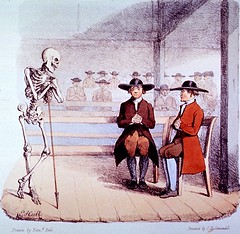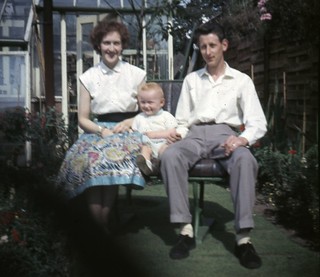Death be not complacent
 Pete Seeger died last week. He was 94. As a lover of folk music, it’s hard to imagine someone who more powerfully embodied that genre’s ideals. A man of principle who believed the best thing to do with a song was share it, a man who used his music like a well from which to draw joy.
Pete Seeger died last week. He was 94. As a lover of folk music, it’s hard to imagine someone who more powerfully embodied that genre’s ideals. A man of principle who believed the best thing to do with a song was share it, a man who used his music like a well from which to draw joy.
What struck me as I read the many tributes to him in emails, tweets, and Facebook posts was that death is different as you age. I lost an older brother at 13. That was a shattering experience. In my 20s, I can only remember going to one funeral – a young man who died tragically in a roller-blading accident. It was a poignant service.
By now, I’ve lost tons of uncles and aunts from my long-lived clan; too many. The most recent was just last week, my aunt Stella. A few cousins too, and of course, my dad. And outside of the family, I’ve lost friends, primarily to cancer, that blind killer of the old and young alike.
I have had more encounters with death than I’d prefer. But what once was momentous has become an event that is sad, inevitable, and far more anticipated than before. So what should we men of a certain age learn from death?
Don’t sit on things. When I was diagnosed with bladder cancer, it was caught early because when I saw blood in my urine, I DID something about it. Ignoring symptoms is rarely a good idea.
Acknowledge your own mortality. Yes, you feel good now. It’s easy to tell yourself — seriously — that you’re bulletproof. But be realistic. Bodies change, fitness changes; if you are an average guy, you’re likely not as strong as you were 20 years ago, as fast. Accept it (without giving in and giving up). Set fitness and activity goals that aren’t going to leave you groaning for days afterward or in the ER.
Do stuff now. When I turned 40 and got cancer, it woke me up and I made some changes that I’d idly thought and talked about for years without taking action. It’s always time to do that. Investment guru John Templeton once said “The best time to invest is when you have money. This is because history suggests it is not timing the markets that matters, it is time.” You HAVE time that you can invest in anything you want to do. Right now. Do something.
Think a little bit holistically. No, I’m not suggesting buying a juicer or getting your chakras aligned. But when I was younger, I didn’t make the connection between my body and my mind. Using tools like yoga, meditation, therapy, etc. doesn’t only improve your psychological health. It can make you exercise better and, in my experience, make you enjoy your exercise routine more by deepening your concentration.
Death is inevitable. It’s going to come to all of us at some point, and we will be reminded of that by the loss of friends and family from time to time. But don’t take that inevitability as impending doom; take it as a reminder that with a finite amount of time allocated, it’s up to us to make the most of it.
(photo Creative Commons licenced by Flickr user Leiris202)
Read MoreBalance. I have it. Sometimes.
 In my 20s, I used to work as studio director for a radio morning show. Often, I’d stay up, watch Late Night with David Letterman, and then hit the sack, only to get up and hit the road to be at the station at 5, bright-eyed and bushy-tailed with coffee for the gang. A little later on, I worked at a 24-hour news network, and my shifts were almost always 3 a.m.-11 a.m. or 4 a.m.-noon. I’d come home, do some other work, my partner would come home, and I’d almost always be in bed after 10 p.m. Five hours sleep was fine. In an magazine job, all-nighters were common as we got to production.
In my 20s, I used to work as studio director for a radio morning show. Often, I’d stay up, watch Late Night with David Letterman, and then hit the sack, only to get up and hit the road to be at the station at 5, bright-eyed and bushy-tailed with coffee for the gang. A little later on, I worked at a 24-hour news network, and my shifts were almost always 3 a.m.-11 a.m. or 4 a.m.-noon. I’d come home, do some other work, my partner would come home, and I’d almost always be in bed after 10 p.m. Five hours sleep was fine. In an magazine job, all-nighters were common as we got to production.
If I tried that now, I would implode in a week. And that isn’t always the easiest thing for a man to admit. We’re supposed to be invulnerable, aren’t we? One of the things I’ve noticed as the years have gone on is I can still be as intense as I was in the past (I think!), but that I can’t maintain that level of intensity for same length of time. I attend a music-industry conference each year where part of the deal is attending music sessions that go on until about four in the morning. I can do that, but inevitably there’s a post-conference crash.
Combine the fact that my “energy well” isn’t as deep as it used to be with the lifestyle of a self-employed consultant, where the pace can sometimes oscillate between frenetic and … what now? and you have a recipe for stress.
I have a few things I try to do to combat that stress. I try to keep my sleep habits as regular as I can. I’m lucky in that I rarely have insomnia, so it’s easy for me to stay rested most of the time. That keeps the energy supply high.
If there’s a frenetic period on the horizon, I will try to book downtime to recharge my batteries after the urgency subsides. Better to book it and keep it for myself than to carry on as if I didn’t just complete a herculean task and end up crashing.
And I try to keep my regular appointments sacred. Yoga class, exercise, and the like can sometimes feel like a distraction that I “should” skip “just this once.” But that has an impact down the road. Short-term gain for long-term pain.
It’s not easy to stay energized all the time. But if you can learn — even attempt — to manage yourself a little better, you can perform at a higher level all the time, rather than some roller-coaster cycle of sprinting, and then collapsing.
What are your tips for managing energy levels? Tell me in the comments.
Read MoreGuyside: Dealing with aging parents, guyside style.

As parents age, we have to move from being “their child” to mutual independence to their dependence on us. It’s not always easy.
One of the things about getting to this age (in my case, 47) is that you get the odd experience of parenting your parents.
I was about the last child in my generation. With both parents near the end of large families, I have a ton of cousins, many of whom are well into retirement by now. And as a late child (born to 41-year-olds), my mom (and my dad, until his death in 2012) is well into seniorhood.
It’s probably no surprise that the dynamics change when your parents age. As a child, we strive for independence from our parents. That lasts for some time and then, like a wave collapsing in on itself and running back into the ocean, dependence begins to reach back out from your parents to you.
Things that were easily done for years become more difficult. It becomes more challenging for the senior citizen to take on some of the frustrations of daily living. And if physical illnesses encroach, as they almost certainly will, that process can accelerate more and more as time goes on.
So here, from my own experience and with the help of some references I’ve found, are some tips for dealing with aging parents:
- Find ways to detach emotionally just a bit. It’s difficult to hear a parent in emotional or health difficulty. But if your emotions take over, it’s going to be difficult to truly help them. Create an outlet for your emotions, but then work on logic.
- Sometimes just listening is enough. As a guy, I know only too well I can jump to SOLVING THE PROBLEM. But sometimes, your parent won’t want a solution; they’ll want a set of ears.
- Talk to your parent or parents about power of attorney. There are times at which you may need to intercede. It’s easier to do that if you have arranged things in advance.
- Support anything your parents are interested in doing that will help their physical, emotional, or mental health. Got a 97-year-old (like my aunt) who loves to swim? Make sure he or she gets to the pool. Is someone a bridge player? Find them a club. Often, seniors lose friends and family members as they age, so new social links are important.
- Build relationships with their health care providers. As seniors age, it’s more likely they’ll have serious health concerns crop up. And seniors are more likely to have a more deferential attitude toward doctors and medical professionals than younger people. So it’s important that you be able to play a role in their health care. This doesn’t mean taking over; it can mean being a trusted resource, an advocate, or maybe just a drive to an appointment.
Guyside: Don’t let winter weigh you down

There may not be a five-mile skating rink like Ottawa’s Rideau Canal in your town. But there are lots of opportunities for physical activity, even when the days are short and temperatures drop.
Where I live, this is the darkest time of the year. Instead of a beautiful sunrise when I wake up, it’s dark. When my partner is walking home from her office, it’s also dark. The layers of clothing get added to. The gloves and the puffy jackets come out of the basement. And the road bike gets brought inside and put on the trainer. Even though the winter solstice in December marks the is a welcome “bottom” to the year, before and after, the days are dark and short and cold.
When I was a kid, winter was the time for snow forts and snowmen and skating in the community rink while Anne Murray tunes scratched over the PA system.
Now, winter is the time of year where I have to shovel the driveway, wear heavy boots that I don’t like, and the time when I can’t ride (I know I could ride, but I’ve never been a winter cyclist type).
When it’s snowy and cold, It’s easy to find that hot new series to watch, to light a fire, pop some popcorn, and wait for spring. It’s just too tempting to simply hibernate in the house over the winter months. And it’s also a terrible idea when it comes to men’s health.
In Canada, studies show that people are nearly twice as likely to participate in any physical activity in summer compared to winter. And if you look at the sporting activities Canadians participate in, only two of the top 10 are winter sports. In Canada, it shouldn’t be surprising to anyone that ice hockey bumps up winter sports participation numbers, and even with the burgeoning popularity of women’s hockey it’s still predominantly male.
And the irony of all this is that when you exercise outdoes in the winter you burn up to 31% more calories than in warmer weather.
So, some tips for guys like me who don’t play hockey or ski for getting out there:
- “There’s no bad weather, just bad clothing” is an a age-old proverb. So if you’re going to invest, invest in good layers of clothing. Go to a store that specializes in outdoor gear for winter so that you can benefit from knowledgeable staff. Fitness magazine has some tips on how to dress for outdoor exercise.
- If you’re a beer-league hockey player, don’t just rely on the hockey to keep you fit. The start-stop nature of hockey can be dangerous for people who don’t have a good base of fitness.
- Some sports — hockey and skiing come to mind — can be pricey to participate in. But skates and snowshoes are cheaper than fully kitting out for playing hockey or going downhill, and walking (with appropriate footwear that will keep you stable) is the cheapest form of all. I live in Ottawa, where for several weeks each year the Rideau Canal turns into a free five-mile skating rink (your hot chocolate will cost you, though). Also, rent before you buy if you aren’t sure if you’re going to stick to a given activity.
- Find a buddy. There will be times when you can’t drag your own sorry butt out for that workout, which is when you need the nagging, cajoling, and potential bribery of a friend to get you going. Use that help, and offer it to your workout buddy.
- If you just can’t stand winter, then bring your sport indoors. My road bike is hooked up to a trainer, so I have the opportunity to ride inside. Other people go to spinning classes to benefit from the motivation of others suffering around them (N.B.: One discovery from spinning — all that sweat that evaporates when you’re riding the bike outside turns into a puddle beneath the bike when you spin. Be warned.)
- Even if you don’t hit the gym in summer, many will offer “winter membership” or monthly memberships.
If your tendency, like mine, is to go to ground when exercising is no longer just a matter of tossing on a t-shirt, shorts, and going, then you, like me, have to just work a little harder to not give in. Besides, drinking that cocoa will feel SO much better if you skated five miles to get it.
Read MoreGuyside: Get advocaty, dude
My forties have been a tumultuous time for me, healthwise. Essentially, I went from someone who had few problems physically or psychologically — at least ones I was willing to acknowledge, even to myself — to a rare diagnosis of bladder cancer, a bout of clinical depression, and some of the stresses and damages that go along with the clock.
I’ve lost a parent, a parent-in-law, and a number of friends. And one of the things that I’ve learned through my experiences and those of friends and loved ones is the value of being a self-advocate for your own health.
It’s not just a cliche that men don’t take care of themseves. It’s a fact. A 2011 article in Monitor on Psychology points out that not only do men take worse care of themselves than women, they are far less likely to seek health care out. That double whammy could contribute to men’s shorter life expectancy.
So how do we become better self-advocates?
First, we need to go to the doctor (or, in my case, the nurse practitioner), and we need to be more clear about why we’re there. A WebMD article tells the story of one man who visited Dr. Paul Haidet:
“A 50-year-old Boston dockworker with no serious illness in his past, the patient said the cough had been hanging on for three weeks. Haidet noted the details, performed a physical exam, and diagnosed an upper respiratory tract infection. “The guy had a cold,” Haidet tells WebMD. He recommended cough syrup and was about to leave, but something gave him pause. The patient “just had this weird look on his face,” Haidet recalls.
Haidet learned that the man’s best friend had recently died of lung cancer and when his friend was diagnosed, he had a very similar cough. As a longtime pack-a-day smoker, the patient was afraid his number was finally up.”
Second, do some research. I read a lot of stuff. And I try to read it critically, to understand the context. For example, if I read an article about a lawsuit over a bladder-cancer drug, I don’t have an immediate fear reaction; I learn the particulars. Be sure to use reputable sites like the Mayo Clinic, WebMD, the NIH, the AMA, or associations concerned with a disease.
3. When you’re in a doctor’s office or at a clinic, don’t just nod your head. Come in with questions, and be prepared to ask for clarification of terms or concepts that you don’t understand. The Agency for Healthcare Research and Quality has a great checklist of questions for tests. That’s just one resource you can use.
4. Be politely persistent. I recently was searching out a referral to a specialist. Turned out the referral was being sent to the wrong place by my family practice. If I hadn’t been persistent in asking, who knows how long it might have taken to make it work. Because I discovered the error by checking with both sides of the transaction, I was able to ensure the connection was made, reducing my wait time.
These are just a few things we can do. If you’re looking for more ideas about self-advocacy, check out these resources:
- Seven Counties’ Introduction to Health Policy and Advocacy
- Be Your Own Health Advocate by WebMD
- The Center for Advancing Health
- “Be The Squeaky Wheel” by Care2
And remember: As of January 2014, Guyside will now be taking over the Wednesday Bubble slot, and if you’ve got something to say around the topics of men, health, and aging, we want to know. If you are interested in contributing, drop us a note at flashfree111@gmail.com.
Read MorePondering the weighty subject of… weight.

Guyside columnist Bob LeDrew will never be mistaken for this person.
I know I don’t. But I do see a certain uptick in that “time spent thinking about diet” graph in recent years.
As an adolescent, I was blessed with a metabolism that burned everything I could shovel into my mouth and then some. And even through most of my adult life, I really haven’t thought about diet beyond “when is the next meal?”
But as I edge toward 50, I have started to make some changes. Why? First, I have seen that little band of blubber around my waist grow from a finger-width to what is probably 15-20 pounds of weight I don’t really need. Second, my encounter with bladder cancer in 2006 led to some increased concern about health in general. Third, it was always so simple when you could go out for beer and wings at will and never show any effect (my personal best: 80 wings with an unwise quantity of beer to wash ‘em down in an evening), but when you start to feel the hangover from booze as well as post-gluttonous digestive effects, it makes you think.
At least when it comes to body image, I think men and women are working from two separate objectives. It’s my belief that generally, women are more affected by pop-culture images of women than men. I don’t look at Hugh Jackman and think “I’m grotesque.” I think men are more tied to the body image of their younger selves, and that it takes some sort of breakthrough for a man to realize that his body isn’t the same at 47 as it was at 17, or 27.
And of course, it’s clear that we men have some real issues around body image — and body reality. Even if you think you’re fine, men in the United States have a real-life obesity problem. Check this out.

These guys show the “average” man from each of the US, Japan, the Netherlands, and France
I certainly am aware of this reality. And I would like to make some changes. I don’t need or want to turn into the aforementioned Mr. Jackman. So here’s an entirely arbitrary list of what I think is going on with my diet — what I am doing right, and what I am doing wrong at this point?
Good points:
- I don’t eat a lot of fried food
- My vegetable intake is good
- I eat fish at least once a week
Now the weak points:
- Too many canned soups for lunch (bad for the sodium count)
- My long-term love affair with all things chocolate needs to be pruned
- Not enough snacking action using “healthier things” like fruit or things that aren’t chocolate
- I like beer
I’m going to start doing two things. I’m going to track how many healthy snacks I eat and how much chocolate I consume. And every week, I’m going to update this table as a way of being accountable to you — and to me.
| Healthy Snacks | Chocolate | |
| Week of October 13 | 0 | 2 bars, 1 gelato |







